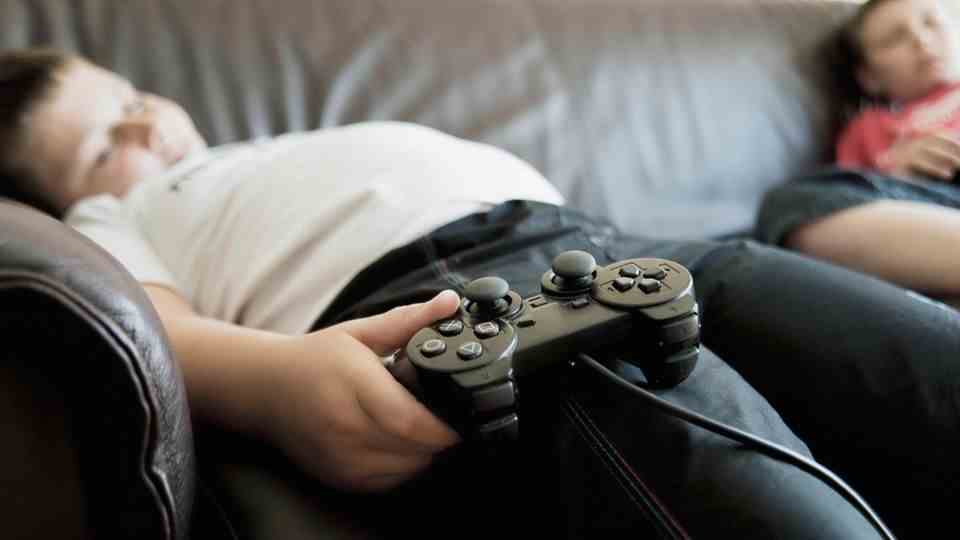obesity
Superfluous kilos: More and more children are suffering from morbid obesity
The number of children suffering from morbid obesity has steadily increased over the past ten years. (icon picture)
© Jens Büttner / Picture Alliance
More and more children and young people are overweight – they suffer from morbid obesity. This is probably not even surprising: those who sat at home during the lockdown and reached for chocolate and soft drinks gained weight. Only: does it stay that way? An expert has a clear opinion on this.
According to a new study, the number of children and adolescents with morbid obesity has been increasing significantly nationwide for years – especially during the corona pandemic. Between 2011 and 2021, the number of 6- to 18-year-olds affected by obesity grew by 33.5 percent. In the sub-group of 15 to 18 year olds it even increased by 42.5 percent and in boys from 15 to 18 years by 54.5 percent. This emerges from data from the KKH commercial health insurance company in Hanover. According to Christine Joisten, board member of the Working Group on Obesity in Children, there is a massive increase, especially in social hotspots.
Corona lockdown has increased cases of obesity
The health insurance company warned that the lockdown phases during the pandemic had made the situation even worse. The number of obesity cases alone from the pre-Corona year 2019 to 2021 among 6 to 18 year olds increased by 10.7 percent, among 15 to 18 year old boys even by 18.7 percent and among girls of the same age by a good 12 percent. According to the KKH, it has around 1.6 million insured persons.
According to the KKH, obesity is one of the most common chronic diseases in childhood and adolescence. For the study, the insurance company collected anonymous data from its insured persons aged 6 to 18 with the corresponding diagnosis. In 2021, an average of 6.0 percent of children and adolescents were affected, in 2011 it was 4.5 percent.
“Homeschooling with sitting in front of the PC for hours, a lack of physical education, hardly ever meeting friends, closed sports facilities – the pandemic with all its contact restrictions has thrown the lives of many children and young people out of balance for a long time and encouraged inactivity,” judged Aileen Könitz, doctor and Expert for psychiatric questions at the health insurance company. “It was a gateway for substitute actions to compensate for frustration, stress and feelings of loneliness.” With substitute actions, Könitz alludes to the use of fattening foods such as soft drinks, chocolate or chips – or to crouching in front of the screen for hours.
Childhood is the basis for health in adulthood
Könitz emphasized: “This trend is dramatic, because the foundations for good health in adulthood are laid in childhood.” Being extremely overweight at a young age can lead to health consequences such as high blood pressure, diabetes, dyslipidemia or joint wear and tear and reduced life expectancy. The consequences of obesity could also shake the psychological balance of children and young people: “Discrimination and bullying because of their body weight are part of everyday life for many of them,” she said. “Experiencing exclusion not only weakens self-esteem and reduces quality of life, but can also lead to mental illnesses such as anxiety or depression.”

Too much time in front of the screen and too little exercise: in 2021, an average of 6.0 percent of children and adolescents were affected by morbid obesity.
© YAY Images / Imago Images
Nobody is helplessly at the mercy of the risks of obesity, such as the wrong, high-fat and high-calorie diet, lack of exercise and excessive use of television or smartphones. The role model of the parents is central to prevention. Könitz advised parents: “Make your child aware of the risks of being overweight and take personal responsibility for their own health.” In the fight against unwanted pounds, the most important thing is that children want to change their lifestyle and behavior, are motivated to work and are mentally strengthened – which demands “a lot of strength, patience and perseverance” from parents.
Joisten, on the other hand, assumes a lasting effect: “The world doesn’t change,” she said. Although the pandemic “washed up” the role of digital employment, children’s exercise time was bad even before that, and high-calorie foods were already available. According to a study in the Cologne area, obesity among children and young people has increased compared to 2016, especially in social hotspots, while it has remained the same in economically strong parts of the city.
At the same time, she lamented the decline in outpatient therapy centers: “We don’t get these children cared for.” She called for the right conclusions to be drawn from the study and for a uniform system to cover costs to be set up – so far, health insurance companies have been able to cover the costs, but they don’t have to.



